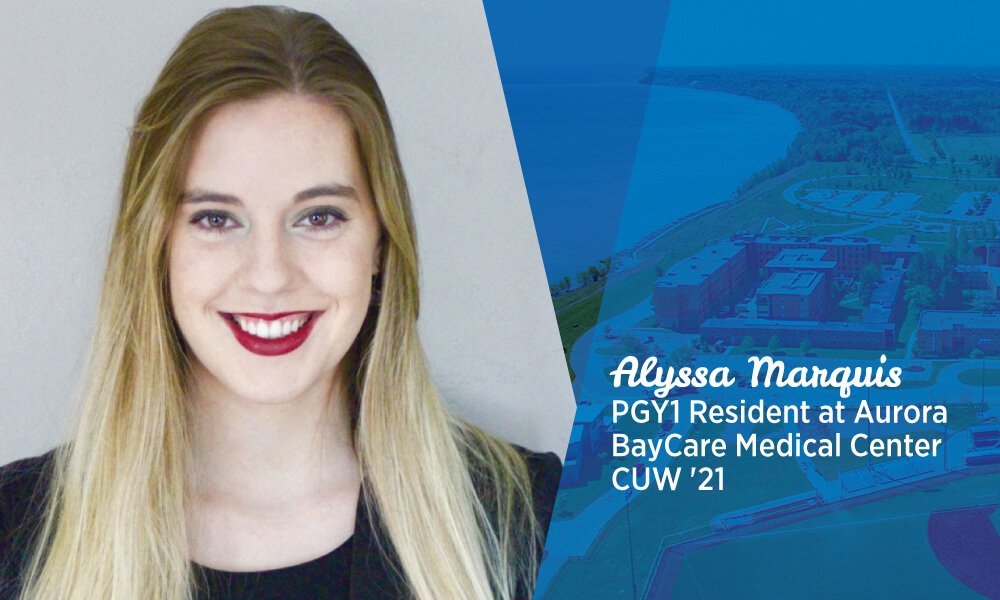
Did you know that you can pursue more clinical education through a post-graduate residency?
Choosing to complete a post-graduate residency
After graduating from pharmacy school, you can pursue more clinical education or research. If you choose the research path, that’s called a fellowship. (Read all about Austin’s fellowship experience here.) But, if you choose to pursue clinical education, that’s called a residency.
What is a residency?
A pharmacy residency is an organized, directed, postgraduate training program in a defined area of pharmacy practice. It provides the knowledge and experience to further training with a clinical focus. During residency, a resident performs as a licensed practitioner but trains under the supervision of an experienced preceptor. As many as 42% of Concordia University Wisconsin’s School of Pharmacy graduates pursue either a residency or a fellowship.
Learn about Alyssa Marquis’s experience in her residency by reading more.
What is your current role?
I’m currently a post-graduate year 1 (PGY1) pharmacy resident at Aurora BayCare Medical Center. In my role, I help manage medication therapies and monitor patients admitted to the hospital for many different reasons. (Some of these reasons include: infection, surgery, stroke, trauma, exacerbations of chronic illness, and more.)
Also, I spend time in the VLCC Cancer Clinic. In this clinic, I help with patient monitoring and counseling, chemotherapy preparation, and investigational drug services. Next year, I’ll transition to Aurora St. Luke’s Medical Center to complete a post-graduate year 2 (PGY2) pharmacy residency in oncology. I’m so excited for the opportunity to specialize in this field of medicine and spend my career working with oncology patients!
What made you want to pursue a post-graduate residency after graduation?
After shadowing and working in a few different pharmacy settings throughout my time in school, my career goals became clear to me. My goals included becoming a clinical specialist in oncology while working closely with patients. Additionally, I’d like to include academia and teaching in my future. I knew that a pharmacy residency would help me reach these goals. Pharmacy residencies provide countless opportunities to work closely with patients and fellow learners (interns, students, residents) in a challenging and motivating environment.
How did CUW help prepare you for a pharmacy residency?
CUW was essential for my residency preparation. Each of the professors have such a passion for teaching. My time in the classroom and patient care labs really created a strong foundation for me to prepare for licensure exams and real-world clinical practice. I was also able to dedicate time to teaching, tutoring, and working with fellow students through CUW and nationally-recognized pharmacy organizations. One of the most influential ways CUW helped prepare me for residency was the residency pathway program. This included required coursework, specific experiential rotations, and a year-long project that each helped to further the skills required of a resident. It felt like a mini sample of what residency year is like!
How do you think your residency is preparing you for a successful career in pharmacy?
A residency year is really 12 months of countless opportunities to learn. The ability to rotate throughout each area of the hospital has allowed me to involve myself in the interprofessional team and share unique patient-care experiences. This has inspired me to grow in my confidence and ability to manage complex medication therapies. One of the most important lessons I’ve learned is that pharmacy is both a science and an art. It has become so important to take everything you learn in the classroom and pair it with each patient’s unique experience and characteristics to have the most positive and lasting impact on their overall health.
Above all, I’ve found that as pharmacists, we have the opportunity to help beyond the medications. We can support each patient’s overall wellness by listening to each patient’s story and collaborating with the entire healthcare team
What has been the most memorable moment of your residency?
The most memorable moments of my residency have been the medication counseling sessions I have with oncology patients starting their first round of chemotherapy. Whether it’s discussing a new therapy, answering questions about what to expect, or reviewing their current home medication list, it is humbling to use my passion for medicine to help others during such influential times in their lives. Above all, I’ve found that as pharmacists, we have the opportunity to help beyond the medications. We can support each patient’s overall wellness by listening to each patient’s story and collaborating with the entire healthcare team.
What advice do you have for future pharmacists?
I would encourage future pharmacists to seek and take any opportunity that sparks excitement or interest. I have found that it never hurts to try something new, and that some of the most influential roles or experiences may be found in the process of allowing yourself to explore any potential passions you have!
This blog was originally published on December 21, 2021. It has been updated to reflect current information.